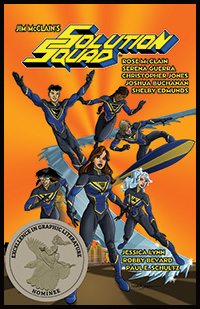
In the glory days of high school, when I had left comics behind, there were still ways for me to enjoy my favorite superheroes. For some reason, reading comic books was scorned, but reading novels about comic book superheroes was A-OK. Following his successful Superman novel, The Last Son of Krypton, Superman scribe Elliot S. Maggin cooked up a doozy.

Published in 1981 as a movie tie-in to Superman II, even though they had nothing in common except the main character, Miracle Monday tells the story of the demon, C.W. Saturn, sent on a mission to destroy Superman’s morals. To do so, he inhabits the body of time-traveling journalist Kristin Wells, who has joined Superman’s supporting cast to research Miracle Monday, because in the future, no one knows why it’s celebrated. By creating a situation where Superman will be forced to kill his host, Saturn taunts Superman, even going so far as to reveal the Man of Steel’s identity to the world.
The great thing about this novel is that Maggin gets the heart of Superman. He does good. He fights to preserve life. And for goodness sake, he doesn’t kill. Ever. There’s a scene in the first chapter where Pa Kent is having a nightmare about his son simply killing the criminals he stops. The boy takes over a delicate eye surgery and humiliates the surgeon. He even offers to take over the country’s military because he’s going to be running things anyway. In the dream, Pa, as a last resort, goes out to a field to find some buried Kryptonite and agonizes over what he might have to do, but Superboy is there, and takes the shovel away, swings it at Pa, and Pa wakes up. Pa goes to his boy’s room, where Clark is examining a dead grasshopper. Pa gets a might nervous about it, until Clark explains that he wasn’t the one who killed it. He just wanted to find out why it died where there were no obvious signs. Pa is relieved that his son values life.
And all of that is just part of Chapter 1.
What Elliot Maggin really digs into in this novel is how Superman perceives the world. With all of his fantastic senses, he sees colors that no one else can see. He doesn’t bother to name them because there’s no one with whom he can talk about them. And he sees the energy given off by living things. There is a scene where he is distracted by a conversation with Lana Lang on the school bus, when it accidentally hits an old dog from a neighboring farm. Clark can literally see it die as its energy dissipates and goes cold. It upsets him so much that he gets physically ill. It’s all part of growing up to be Superman:

Without going into excruciating detail, Elliot Maggin’s Superman novels, both of them, were instrumental in the formation of my morals. This is no Man of Steel Superman, which I found to be as cold and lifeless as the dead dog. This is my Superman, more along the lines of Christopher Reeve. And honestly I don’t care if it’s corny. It was the foundation of a successful and beloved character for almost 50 years before John Byrne’s reboot in 1986 turned Superman into a Marvel character. There’s nothing wrong with Marvel characters. It’s just that Marvel was already publishing plenty of them. This Superman was fundamentally good.
Another wonderful aspect of this Superman, particularly in Maggin’s books, is his relationship with Lex Luthor. In the 1986 revamp, Luthor was turned into a middle-aged scientist/businessman. Back when this novel was published, Luthor and Superboy grew up together in Smallville. They were even in the same class. They weren’t rivals. Luthor literally had no peer. But his ambitions always got the better of him and he learned harsh lessons by having to go to reform school. Luthor is not just a two-dimensional figure in Maggin’s hands. He’s devious, yes. A criminal, sure. But he maintains several separate identities to perpetuate his criminal activities, even when he’s incarcerated. It’s not LexCorp as it was presented in the 80s, but LexCorp’s seeds are certainly found here. And Luthor even attended classes at Metropolis University in one of his many guises, and Superman, as Clark Kent, tries one last time to reform him, to bring him to the light. He’s even ready to reveal his secret to Luthor, but the criminal refuses the meeting. After all that, this is a Superman who never gives up on him. Even at the end of the novel, Superman asks the time-traveling Kristin:
“Just one thing. Do I ever make friends with Luthor again?”
She thought about how to tell him and how much to tell him. He was Superman, after all, she had to tell him something. Finally, she just whispered, ‘Someday.’”
No, this Superman is not hard core. You would never see him with glowing red eyes. He would not destroy most of a city just to fight Zod. This Superman is about hope, and I don’t mean some alien symbol that looks to us like an S. This is also a Superman not written exclusively for children, as we often hear said in today’s jaded exposition, calling him a “boy scout” or a “do-gooder.” This is the most complete version of Superman you could ever read about. And if you don’t believe me, ask Mark Waid, who is often credited with writing some of the best modern Superman stories:
| “Miracle Monday is my textbook on Superman, who he is, and who those around him are. My textbook.”— Mark Waid |
Elliot Maggin has published a second edition of Miracle Monday. You can find it here. You would be doing yourself a favor to read both of Elliot’s Superman novels.

Good Miracle Monday, everyone!


